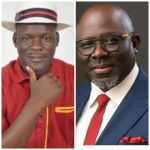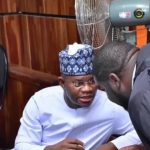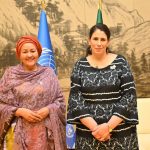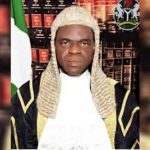30 Years After, Nigerians Celebrate Democracy Day in Honor of Chief MKO Abiola
By Wilson Macaulay
June 12, 2025
Yesterday, across Nigeria, citizens from all walks of life gathered at designated public places to commemorate 30 years of Democracy Day, a national holiday observed every June 12 in honor of Chief Moshood Kashimawo Olawale (MKO) Abiola, the acclaimed winner of the June 12, 1993 presidential election — a watershed moment widely regarded as the freest, fairest, and most credible election in Nigeria’s political history.
Three decades after that historic poll, which tragically marked the beginning of Abiola’s political martyrdom.The nation remembers the man who paid the ultimate price in the pursuit of justice, truth, and democratic freedom.
A Historic Mandate Denied
On June 12, 1993, millions of Nigerians turned out in record numbers to cast their votes, transcending ethnic, religious, and regional lines. MKO Abiola, the candidate of the Social Democratic Party (SDP), won a landslide victory, defeating his rival, Alhaji Bashir Tofa of the National Republican Convention (NRC).
However, in a stunning and controversial decision, the military regime led by General Ibrahim Babangida annulled the results, plunging the nation into political turmoil. Despite national and international condemnation, the IBB regime refused to recognize Abiola’s victory.
A Struggle That Ended in Martyrdom
Unyielding in his resolve, MKO Abiola declared himself the lawful president of Nigeria on June 11, 1994. He was arrested shortly after and detained for four years under solitary confinement by the Sani Abacha-led military dictatorship. During his incarceration, calls for his release intensified both at home and abroad.
On July 7, 1998 — under suspicious circumstances and just as his release seemed imminent — Abiola died in custody, exactly one month after the sudden death of General Abacha. His death triggered an outpouring of grief and anger across the nation and sealed his legacy as a democracy icon.
Posthumous Recognition and Legacy
For years, democracy advocates and civil society groups pushed for proper recognition of MKO Abiola’s sacrifice. That recognition finally came in 2018, when President Muhammadu Buhari posthumously conferred on Abiola the title of Grand Commander of the Federal Republic (GCFR) — Nigeria’s highest national honor typically reserved for Presidents.
In the same breath, Buhari declared June 12 as Nigeria’s official Democracy Day, replacing the previous May 29 observance. In doing so, Buhari affirmed that MKO Abiola was Nigeria’s rightful President-elect, thereby acknowledging the validity of the June 12 mandate and the injustice that followed.
Celebrations Across the Nation
This year’s celebration — themed “Democracy: Honoring the Past, Securing the Future” — is particularly significant as it marks the 30th anniversary of the election and the 7th observance of June 12 as Democracy Day.
From Lagos to Abuja, from Kano to Port Harcourt, the atmosphere was one of reflection, celebration, and recommitment to the ideals of democracy.
At Eagle Square in Abuja, President Bola Ahmed Tinubu, himself a former pro-democracy activist and ally of MKO Abiola, led a wreath-laying ceremony and addressed the nation. In his speech, he said:
> “Thirty years ago, Nigeria chose unity, equity, and progress. MKO Abiola symbolized those values. Today, we reaffirm our commitment to building a democratic nation where the will of the people reigns supreme.”
Former President Goodluck Jonathan, Vice President Kashim Shettima, Senate President Godswill Akpabio, and other dignitaries also paid glowing tributes to Abiola and all who struggled for democracy.
In Abeokuta, the hometown of MKO Abiola, tributes flowed from family, friends, politicians, and activists at a special memorial service held at the Abiola family house and the MKO Abiola Stadium. Governor Dapo Abiodun of Ogun State described Abiola as a “pillar of democracy and a pan-African statesman who lives forever in the hearts of Nigerians.”
Governor Sheriff Oborevwori’s Address, Delta State
In Asaba, Governor Oborevwori led the Democracy Day observances, congratulating Deltans and all Nigerians on this significant occasion. He emphasized the vital strength of democracy being rooted in “the power of the people” and highlighted his administration’s commitment to aligning Delta State’s infrastructure development with national democratic ideals .
He remarked:
“Happy Democracy Day to all Deltans and Nigerians. We thank God for another wonderful year of democracy amid our challenges, and I am optimistic about the growth and eventual flourish of our democracy.”
In his address, Governor Oborevwori reaffirmed his administration’s resolve to improve public infrastructure and uphold the democratic values embodied by Chief MKO Abiola.
Rt Hon Emomotimi Guwor’s Speech, Speaker of Delta State House of Assembly
Also joining the celebrations, Rt Hon Guwor extended warm greetings, declaring:
“Happy Democracy Day to us all. God bless our beloved nation, Nigeria.”
As Speaker of the Delta State House of Assembly, he underscored the unity of purpose among lawmakers and citizens in preserving democratic institutions, reflecting on the importance of this day in binding communities together.
These addresses further gave filip to the theme of unity and democratic renewal resonating across Nigeria on this 30th Democracy Day, adding a powerful regional dimension to national reflections on the legacy of Chief MKO Abiola.
A Symbol of Unity and Sacrifice
MKO Abiola’s life story continues to inspire generations of Nigerians. A successful businessman, philanthropist, and politician, he championed causes for the poor, the marginalized, and the voiceless. His campaign slogan, “Hope ’93”, remains one of the most iconic in Nigeria’s electoral history.
Today, June 12 is now more than just a date — it is a symbol of Nigeria’s democratic rebirth, a reminder of the resilience of her people, and a tribute to those who laid down their lives for freedom.
As the nation looks to the future, Democracy Day 2025 stands as a clarion call for Nigerians to guard their democracy jealously, to resist tyranny in all forms, and to honor the sacrifices of those like Chief MKO Abiola, whose unshakable belief in the people’s right to choose became the cornerstone of a new democratic Nigeria.
A Symbol of Hope and Unity
In death, Chief MKO Abiola became more than a politician — he emerged as a symbol of Nigeria’s enduring quest for democracy, equity, and good governance. His legacy continues to inspire generations of Nigerians to uphold the values he embodied: courage, sacrifice, and a steadfast belief in the people’s will.
,
Reflections and Renewed Commitment
As expected, this year’s 30th anniversary commemoration, civil society groups, political leaders, and everyday citizens paid homage to Abiola’s memory. Nation wide wreaths were laid, lectures delivered, and prayers offered in mosques and churches. The prevailing theme across all commemorations was one of reflection, unity, and a renewed commitment to safeguarding democratic values.
Young Nigerians, many of whom were born after the events of 1993, have also taken up the mantle — calling for reforms, transparency, and accountability in governance. Democracy, they insist, must go beyond the ballot box to deliver on the promise of justice, opportunity, and inclusion for all.
A Nation’s Gratitude
As Nigeria market three decades since that fateful June 12, the memory of Chief MKO Abiola remains etched in the national consciousness. His courage and sacrifice reminded us all that democracy is not a destination but a continuous journey — one that demands vigilance, participation, and the collective will of a people determined never to forget Chief MKO Abiola who paid the supreme price for the democracy we enjoy today .
Clearly, Nigerians in their various speeches called for reforms, transparency, and accountability in governance. Democracy, they insisted must go beyond the ballot box to deliver on the promise of justice, opportunity, and inclusion for all. The courage of Chief MIKO and sacrifice remind us all that democracy is not a destination but a continuous journey — one that demands vigilance, participation, and the collective will of a people determined never to forget Chief MKO Abiola who paid the supreme price for the democracy we enjoy today .












